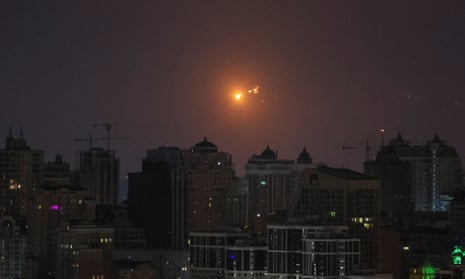
In 2019, the Burkinabé choreographer Serge Aimé Coulibaly opened the doors of his contemporary dance training and cultural production centre in the city of Bobo-Dioulasso. Its aim was to professionalise the talent of young people in Burkina Faso, a poor west African country beset by violence.
One of the first pupils on Coulibaly’s programme, called Ankata Next Generation, which comes from the dyula language word for “forward”, was Kadija Sanou, better known by her stage name Kadi Bobo. The 28-year-old recalled being dragged to the class by a friend from the market where she worked in Bobo-Dioulasso, and the impact Coulibaly’s teaching had on her.
“I used to be afraid and embarrassed to speak in front of people, but Ankata has given me a voice and words,” Sanou said in an interview in her home city.
Sanou completed the multidisciplinary training programme – which comprises dance, theatre, music, painting and artistic production – in 2021, and travelled to France to perform the next year. “My first time in France, I had a lot of problems because I knew the name of the metro stop but couldn’t read it,” she said. “I was afraid they would laugh at me for not knowing how to speak French; now I hope they correct me,” she said.
View image in fullscreenKadija Sanou says the programme has helped her with public speaking. Photograph: Èlia Borràs
Coulibaly’s centre also acts as a sort of artistic laboratory, where an elderly woman, a child begging for money and an enthusiastic young person on the programme can converge.
“Bobo-Dioulasso is a breeding ground for talented dancers who cannot professionalise,” said Coulibaly, who was also born in city. “My goal is for them to be able to create their own paths because when the training ends, no one will give them jobs.”
His concern is well founded: 46% of young people nationally have not accessed training or are not active in the labour market. The figures are worse in urban areas, because in the countryside a majority work in the agricultural sector.
“Ankata is a commitment to develop my country, so that young people can create their own jobs and open new horizons,” said Coulibaly, who started his career as a dancer with the Fereen company in the 1990s then travelled to Europe to develop it further. He is also the founder of the Faso Danse Théâtre company, created in 2002 to produce shows revolving around social concerns and often inspired by political demands. Examples include Kalakuta Republik, about the Nigerian musician and father of afrobeat, Fela Kuti, and Loneliness of an Honest Man, which was inspired by the Burkinabé revolutionary Thomas Sankara.
View image in fullscreenThe Ankata school in Bobo-Dioulasso, where Sanou learned to dance. Photograph: Èlia Borràs
Burkina Faso ranks 184th out of 191 countries in the Human Development Index, and almost half of its young people cannot read or write. It is also one of the youngest countries in the world, with an average age of 17. People under 35 make up 80% of the population and there are not enough jobs to go round. “The colonial system has formatted our minds,” Coulibaly said. “We sit and wait for someone to come and tell us what to do. In the end, we don’t know what to do to our society.”
The country’s economic problems are linked to and exacerbated by a grave crisis of insecurity.
Burkina Faso has been grappling with a jihadist insurgency – waged by rebels affiliated with al-Qaida and the Islamic State group – that spilled over from neighbouring Mali in 2015. The violence has killed almost 20,000 people and displaced more than 2 million.
Anger at the state’s inability to end the insecurity played a significant role in two military coups in 2022. The country’s strongman president, Ibrahim Traoré, has made the fight against rebel groups a priority. According to a UN study, 25% of young people who join terrorist groups do so for economic reasons. About 22% to join with their friends or family, and only 17% for religious ideas.
“I understand that the state allocates its resources to feed the 2 million internally displaced people and not to culture,” said Coulibaly. “Our school is also a space for social reintegration because many of our young people have not gone to school, and here they find another type of training.”
View image in fullscreenSerge Aimé Coulibaly, the centre’s founder, is also behind Faso Danse Théâtre, which produces shows often inspired by political demands. Photograph: Boris Horvat/AFP/Getty Images
As well as being a dancer, Sanou walks around wherever she goes with a backpack full of necklaces, jewellery and crafts that she makes herself.
Recalling her first job offer as a dancer in 2022, she said: “When they called me to work, I thought they had made a mistake. They replied yes, that they were looking for me. I couldn’t believe it.”
Before stepping on to the mat to train or dance, she touches the ground with her index finger and brings it to her heart, in an echo of her youth when during ceremonies and rituals she would touch the feet of elders before receiving their blessings.
The shy woman who used to worry about talking in public has gone. “Now it’s time to develop my own voice.”
Guess what you like
Leave a comment
Email addresses will not be published. Required fields are marked with *



